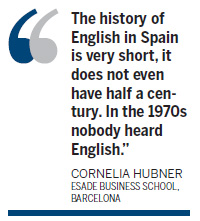Society
Language teaching booming in Spain
Updated: 2011-05-09 07:59
By Daniel Silva (China Daily)
 |
MADRID - Spain's economic downturn is sending jobless workers flocking back to school to learn other languages, mainly English, to boost their appeal to employers, providing a boon for language academies.
With an unemployment rate of over 21 percent, the highest in Europe, many of those with a job are also brushing up their languages skills in the hope that this will help them keep it or lead to a more secure position.
"The deeper the crisis, the stronger people's desire to develop their skills," said Antonio Murillo Isidoro, 37, the director of expansion at English Connection which runs Spain's largest network of English language schools.
English Connection plans to open 20 new schools this year, bringing the total to 36. Over the next five years it plans to open a total of 100 schools.
Other private language schools are also growing as is the popularity of going abroad for a short period to learn to speak another language.
About 150,000 Spaniards traveled abroad to study a language, mostly English, last year, up from 105,000 in 2006 before the start of the economic slump, according to Spanish Association of Promoters of Courses Abroad.
Poor foreign-language skills have long been a weakness of the Spanish workforce.
Nearly one in two Spaniards, or 46.6 percent, cannot speak a foreign language, the fourth highest level in the European Union after Romania, Hungary and Portugal, according to European Union statistics agency Eurostat.
Neither Prime Minister Jose Luis Rodriguez Zapatero nor the leader of the main opposition Popular Party, Mariano Rajoy, speak English - although Rajoy said during a radio interview last month that he studies the language for three hours a week and practices it whenever he travels.
Part of the problem is that the vast majority of Spain's adult population received the bulk of their education while the country was under the sway of General Francisco Franco, who kept the nation isolated.
The overwhelming majority of foreign television shows and movies continue to be dubbed into Spanish, limiting contact with foreign languages.
And while the importance of foreign language education in public schools has increased since Franco's death in 1975, the number of hours dedicated to language training has until very recently lagged what is the case in most other European nations.
"The history of English in Spain is very short, it does not even have half a century. In the 1970s nobody heard English," said Cornelia Hubner, the director of the language training center at Barcelona's Esade business school.
But as Spanish companies, even smaller operations, have become more global in recent years, pushing into new markets across Europe and beyond, more and more employers are looking for workers who speak more than just Spanish.
Knowledge of a second language is a requirement for 58 percent of all jobs in Spain targeted at recent university graduates, and for 65 percent of job offers for mid-level executives, according to recruitment consultancy Randstad.
On a recent morning at an English Connection class for adults in Mostoles, a working-class Madrid suburb, all eight students said their main motivation for learning the language was because employers demand they be able to speak it.
"Everyone asks for it, even for entry level posts," said Javier Ruiz Medrano, 43, who sat in the first row of the class and hopes improving his English skills will land him a better-paying job.
The government has moved to ensure the next generation of Spaniards is fluent in other languages as part of its bid to improve the nation's economic competitiveness.
During an interview last month, Zapatero said Spaniards had an "obvious" problem with English but a "massive implementation" of language training was underway to correct this.
In the Madrid region, one in three state primary schools are bilingual, offering between 30 and 50 percent of class work in English or another foreign language. The goal is to raise this proportion to one in two schools by 2015.
Agence France-Presse
E-paper

War of the roses
European Chinese rose growers are beating their Chinese rivals at their own game
High-tech park gets big boost
At the source
Merchant of Venice
Specials

2011 Sino-US Dialogue
China and the United States will hold the third round of the Strategic and Economic Dialogue from May 9-10 in Washington.

High-tech park gets big boost
Zhongguancun sets sights on being one of the top technology hubs in the world

Learning to close the gap
Thousands of students have benefited from Tibet middle school program set up outside the autonomous region
